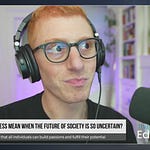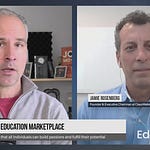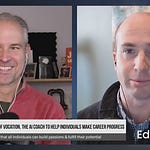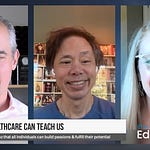On our latest episode of Class Disrupted, I interviewed Diane Tavenner about why America’s approach to math class isn’t adding up. We analyzed the outcomes produced under the status quo, considered the current system’s alignment with workforce needs, and proposed a personalized approach to teaching each student the math that is meaningful for their path—and doesn’t privilege Calculus over things like data science and statistics, but also doesn’t strip opportunities away from those who are accelerating in their studies. As always, subscribers can listen to the episode, watch it, or read the transcript below.
Michael Horn:
Hey, Diane, how are you?
Diane Tavenner:
Well, I'm well, and I'm going to start with urgent priorities today. Do you have any recipes that use a lot of lemons?
Michael Horn:
Lemons, okay.
Diane Tavenner:
And it's not because we're going to make lemonade out of lemons today. It's literally after years of drought, with all the rain we've had, my lemon tree has gone insane, and I have now made curd and cakes and ice cream and ice cubes of juice. And I have run out of recipes and I still have hundreds of lemons.
Michael Horn:
Well, it sounds like you're in California. It sounds like you've had rain. It sounds like I remember why I miss California. And I will tell you, the only other two I will add to your list is preserved lemons for salads. And then, of course, there's an alcohol that you could make as well. But we won't go there today. Instead, we could think about all the ratios and all that stuff that goes into making it just right, because I know you've been wanting to talk about math and some of the things that you've been learning about how our school system thinks or perhaps doesn't think about math in relation to work. So I'd love you to start to unpack that.
Status quo K-12 math pathways
Diane Tavenner:
Well, great, because it's much better that I talk about this with you than turn to the drink because math can make me feel like I want to do that sometimes. So I appreciate your willingness to have this conversation. And what is prompting it for me is, you know, I have thought about math for many years from sort of a K-12 educator perspective, but now I'm coming at it from this new direction where we're really thinking about careers and post secondary and what's getting me going on this topic is my observation of how important math is in careers and how that is really at odds with how people in K-12, I think, think about it. And so let me just lay something out and see if it makes sense to you, which is my experience in K -12 is there's a mindset there and it's a mindset among students and parents and teachers and counselors and kind of everyone who is in the system. We really focus on math almost exclusively in how it relates to college and specifically, like, how do I do what I need to do in math because it's a key to college admissions, essentially? And so the big thinking that ends up happening, especially in high schools, is if I can get all the way to calculus, it gives me a better chance of getting accepted to college. And an elite college at that, maybe into the major that I want. Taking the most challenging…if I can't get to college, taking the most challenging courses that I can in high school relative to what's offered, helps me get into college. Getting good enough grades in math helps in my GPA to get into college. Previously and maybe a little bit again now emerging, taking the SAT and the ACT and getting the best score I can helps me get into college. The point being, as you hear, it's all about getting into college. And as I think about my time in K-12, we almost were never talking about the value of the learning of the math. It was always this entry into college.
Michael Horn:
Yeah, it certainly matches up with my experience as well. Diane, and I know it's playing out there in California. Let's go there in a moment. But I'll just add, Jeff Selingo has made the point to me recently that all of what you just said is absolutely true. And it's a little bizarre that colleges care this much about math because most students, when they get to college, are going to take at most one math class. Now, if you're going to MIT or Caltech, maybe that's different. But for most of us, we get to college, you do your math requirement if you have one, maybe you had gen ed math, so you have to pass a test or something like that, and then most students are sort of done with it, Diane, so it's sort of bizarre how much the college and K-12 system cares about it as an entry point into admission as opposed to anything you're going to do with that track. But let's unpack what's going on in California.
California’s new math framework
Diane Tavenner:
Yeah, this is the other piece that just has me deeply into math right now, which is I feel like California is always having a math war, but there is a renewed math war at the, you know, peaking right now. Over the last multiple years, about four years, California has been trying to, as a state, adopt a new math framework. And this framework has been very controversial. And know was first presented and everyone's outraged. And so they went back and they edited and revised. That's been going on for four years. Well, it just got approved at the state level. Still people are very upset about it. But I've been reading the coverage about it and the arguments around it, and maybe I'll just give you a couple of quotes here that I think go directly to what we're talking about. This is from the LA Times, and the quote is “Another concern of people who don't like this math framework is that many top colleges still place an emphasis on whether applicants get to calculus and how well they do in that course.” And so this is just a well-known, well-communicated expectation from colleges and universities. And what I would also say is from the most selective and elite, because you and I both know there's a small number of those. There's a huge number of colleges that are non selective - you don't need to take calculus to get into those colleges. So it's like this small number really driving the agenda for most people. That's on the one side, you've got these people angry that because we're driving every kid to college, we're not actually focused on equity and going at a slower pace, more kids able to kind of learn together and things like that. And then the flip side of that is parents who are really frustrated and worried that their kids opportunities will be limited and held back. And this actually happened in California and in San Francisco, where they decided they were not going to teach algebra in 8th grade because it wasn't fair and equitable. And so we're literally saying we're withholding learning from some kids in the name of…And on both sides, I'm like, oh, my gosh, Michael, this is not third way thinking.
Michael Horn:
No, not at all. I mean, it goes to the heart of, I think what frustrates both of us around these conversations is that clearly the answer to equity is not the opposite of excellence. And clearly, having a system that drives off the expectation of calculus for all doesn't make a heck of a lot of sense. And I know you've been investigating about how does math even manifest itself into these careers. So I'd love you to tell what you've been finding in that, because that may be the most interesting piece of the puzzle.
The role of math in the modern workforce
Diane Tavenner:
Yeah. And I think that my headline here is, and we're using datasets that lots of people use, so sort of the federal government data sets around labor and statistics and jobs and careers and things like that. And so as we just dig into this and really think about the usefulness of it, my headline is…Well, let me just share with you what we're discovering. So there are approximately 923 careers in the US. And I say approximately because we do, in these data sets, believe there aren't careers that are represented in there. There are some, I will also tell you, that I had no idea were careers. So it's fascinating. It's a little bit of a game. Like, I challenge anyone to write down the number of careers you can think of 923 is quite a lot.
Michael Horn:
There's no way I would get there.
Diane Tavenner:
Yeah, 235 of those 923 literally have math as an important skill for doing that job. And these are jobs where you're going to be doing math kind of on a daily basis, doing calculations, using math in your actual work. And so just some examples of these types of careers. You're an actuary, you're a statistician, those probably seem pretty obvious. You're a sales manager, you're a personal finance advisor. And so I feel like those seem like, oh, but there are 235 careers that are using math kind of regularly. There's 573 careers, inclusive of those 235, that also have math as like, important knowledge you need for doing your job. And so you might not be doing calculations and stats every day, but when you're a pharmacist and an economist, and a wind energy engineer, and a stonemason, and a logistics engineer, and an insurance underwriter and a farmer, you need a grasp of and knowledge of math in order to effectively do your work and to be engaged in your career. The other thing I would just say about this is all these careers, these 573 careers, when I look at them and stack rank them and money isn't everything, but making a family sustaining wage is really important and a thing we aim for. These careers are highly represented in the group that makes, on average, $75,000 or more a year. So in the sort of top end, so not only math an important part of the majority of careers that are in the country in some way, shape or form, but definitely overrepresented in those where you're going to make more money. And here's maybe the punchline. Very few of these careers require any use of calculus, or quite frankly, advanced algebra even. And so most of them require just a strong grasp of real world applications of math, like statistics and fluency and basic math concepts, and confidence that you actually understand these things and practical application of them. And so I just would say this is so contrary to my experience in K-12, where almost no one is focused on math for career opportunities and success. I don't think I ever had that conversation in K-12.
Michael Horn:
No, that makes sense. It's interesting. It brings to mind when I wrote from Reopen to Reinvent, I joined the argument that many more people should be learning data science and statistics, rather than the algebra II into calculus path. And one of the arguments was Anthony Carnivale, who was then the director of the Center on Education and Workforce at Georgetown, had this stat in an article where just 11% of US jobs involved work that required understanding algebra II concepts, and only 6% regularly used those concepts. So a bare minority. But then you're pointing out that doesn't mean the careers don't have math at their heart. It's just not math on this calculus track, if you will, that is a relic, we should add. It's a relic of the sort of distinguishing between vocational education and the college track education, which in our mind is a boundary that should stop existing also. That's an outgrowth of all this. So where do we go, I guess, from here? If that's the reality, where do we go?
Results of the status quo
Diane Tavenner:
Yeah, and I definitely want to get into some solutions. We never, of course, want to leave here without generating some path forward. But it might be worth staying for one more minute on what is underlying this problem because it's not just like K-12 people running around and purposely sabotaging math. I don't think that that's the objective, but I do think that our current design of our K-12 system, kind of, as we know, results in very few, let's call them mathematically literate, let alone fluent students. And I was thinking about this because we talk about reading and we talk about literacy quite a bit. And as we both know, there's a renewed focus on the science of teaching reading and literacy. And I do think as a whole society feels very convicted that everyone should be able to read and everyone should be literate. I'm not sure that that's how we think about math literacy, quite frankly. And so I think one of the things that you're just pointing to that's embedded in the system, the K-12 system we have, is if you have calculation as this destination, and you just said it, there's one pathway, then there's like this sequence of courses that you take, and really it's like every single person's on that same pathway, and it's just how far you're going to get on it in what period of time. Will you make it to algebra? Will you make it to geometry? Will you make it to algebra II? To trigonometry? It's almost like this game of like, well, where is everyone going to fall out, if you will. And this is all driven by this drive to four-year college for all, which is the thing we've been talking about a lot. And so I just think it's worth us noting that only about 8% of high school students actually take calculus. So that is the dropout rate, if you will, of math along this pathway. So I think one thing in the design we need to think about is this pathway concept. I think the second challenge is K-12 is not really connected to employers and to employment. Again, college for all, that's our focus. That's what we thought we needed to be doing. And when you're disconnected from the actual use and what people are doing, I think it's challenging. And then, Michael, there are very few teachers capable of teaching math. I think this is something we're really going to have to grapple with when I'm going through these 923 careers. You need to know a lot of math in order to teach math. And as we just showed, there's a lot of other careers where if you know math, you're going to be very competitive in those careers. They're very lucrative careers. They don't often require as much post-high school education and credentialing. And so why would you choose to be a math teacher? And I will just say math teachers for a long time have been among the very hardest to hire. There are tons of math positions that go literally unfilled every year. And I just see this problem growing and not shrinking. And so I just think those are some of the elements of the system that we need to think about solutions for if we're going to do something different here.
Defining math literacy in the age of AI
Michael Horn:
No, that all makes sense. I'm just curious, and you may not have a take on this if I'm putting you on the spot, but how would you think about defining what is math literacy, as opposed to the completion of algebra two, trigonometry, precal, calc, if that's the old sequence. How would you define that? Or how would you think about creating a definition? Maybe that's the fairer question. And then the second part of it is, I'm just sort of curious if you have a thought of does AI change any of that? We know a lot of these large language models don't do math particularly well today, but we also assume that that will change over time. So I'm just sort of curious how that enters into your thinking or no?
Diane Tavenner:
Yeah, this is such a good question. Well, the first one I love, because you sort of are inviting me to think about a rubric and learning objectives, which, as you know, in my nerdy world is…
Michael Horn :
You geek out there.
Diane Tavenner:
So it's really fun. So the first logical place I think people go is, well, rather than this traditional sequence that most of us are familiar with, sort of this pre-algebra, algebra, geometry, algebra II, et cetera, you go with an integrated mass sequence. And California this is one thing that the state has tried to do in this framework, is promote a more integrated approach, which conceptually I think is maybe in the right direction, in that it does seem to be a little bit more grounded in real world applications. Like, very rarely are you getting these pure sort of subjects when you're using math in the real world. I think it breaks down in a couple of ways. One, I don't know that it is truly connected to real world application. And two, I think in the teaching of it, it's not how math teachers are trained, unless your entire system is doing this when kids are having to move, shift back and forth like it's just a mess. And it's not recognized by college, which is driving things. So I'm not sure integrated math gets us where we need to be. So how would I think about what it would mean to be math literate and math fluent? One way we could start would just be to go look at what is the math that is being done in these careers and quite frankly, in real life. I mean, I don't know about you, but being a human, you have to manage your budget and your finances. What are the real world uses of math, concepts of math,
Michael Horn:
And then pull back and define around that.
Diane Tavenner:
Yeah.
Michael Horn:
Interesting. Okay.
Diane Tavenner:
Yeah.
Michael Horn:
And I guess it'd be super interesting if AI starts to, in fact, change some of these professions. As you know, I'm seeing white papers come across my computer screen saying we don't need to worry about computation anymore. And I suspect there's a point where that's true, and there's a point where maybe it's not true that actually still learning these fundamental processes in the same way we do work about on phonemes and things like that are still building blocks to understanding how math is in fact functioning, even if the manipulation of equations or things like that become less important.
Diane Tavenner:
I had a really interesting conversation the other night with Irhum, who was on our second episode of this season related to AI about this very topic. And there's a big generational gap between us. And so he's always a little surprised about what I did in the old days. So he was saying to me, he's like, I am one of the few people where I literally use calculus in my job. So he is truly using calculus. So he's very mathematically literate and fluent, obviously at high levels. But he was advocating to me that what most people should be focusing on is statistics and data, significantly more to your exact point, and what you've been writing about, and certainly what I agree with and he was so surprised to hear my experience of doing research methods in college and statistics in college, and he's like, wait a minute, you used a calculator, and he's like, why would you do that?
Michael Horn:
Why wouldn't you just type into Excel?
Diane Tavenner:
Literally. The actual computational piece is just far less important to him. It's the conceptual understanding and the application and usage, because in his mind, we have all of these tools that do that. He's like, technology does that so much better than humans. The likelihood that a human is going to make a mistake is very, very high. It's inefficient for us to be doing that type of mathematical work. And in some ways, it's what becomes the turn off to a lot of people, I would argue.
Michael Horn:
Sure, 100%. I mean, when it becomes so about essentially formula manipulation, as opposed to understanding the conceptual underlying what you're, in fact doing right, it turns a lot of folks off. So that all makes sense. If we've identified the problem, we started to define how we would think about literacy and fluency in this world. We can admit we haven't nailed that yet, but sort of putting some questions out there and suggesting maybe some of this might evolve. Can we go to solutions now?
Innovative solutions to our math challenges
Diane Tavenner:
I guess my first suggestion would know, I don't know many people in America who are super excited about the presidential campaign this year. So maybe we take that one out and we sub in a different campaign. And here would be my vote for the campaign of America is that we just need to rethink the importance of being math literate in America and why it matters to each of us. Personally, I used to work with this incredible math teacher, Megan Taylor, and she always tried to drive the point home. She's like, no one would go to a party and casually say, like, “Yeah, I'm illiterate. I can't read,” and be fine with that. And yet, all the time, people, I'm terrible at math. I can't do math. And so this notion that we have gotten comfortable as a nation, that most people are terrible and can't do math, we need a campaign in the other direction of the importance of math and the importance of us collectively being literate at it. A changing expectation. I would want you and I, as starters, to be as passionate about young people coming out math literate as we are them coming out reading, writing literate.
Michael Horn:
Love it. If in future episodes, we cover what presidential candidates should be saying about elections, we'll have to strike this from the record. But I agree, this would be a much more inspiring use of the next year of our national dialogue I suspect.
Diane Tavenner:
Indeed, that second one we've already touched on a little bit and we started to brainstorm there. But we need the math that's being taught. We just need to shift the focus, I think, in K-12 away from how is this a screener for a small number of kids into elite colleges? And how's that driving the whole system into what is the math that is meaningful and useful and used in the real world and really organizing our instruction around that? And again, we've talked about integrated math should be able to do this. Maybe it's the starting place, but it's falling short right now. It needs some work.
Michael Horn:
Yeah. And on this one, and this may bleed into where I think you'll probably go next. But one of the thoughts that I've had is for those individuals like Irhum who like calculus, is going to be central to what they do, I want that pathway available, but I don't want it to be the expectation that that's the only option. And I don't want it to be seen as better or worse than, I just want it to be a choice that I've made because it speaks to me, because it aligns with things that I have learned about my passions and purpose and things of that nature. And it's a considered choice as opposed to something either done to me or an option that I don't even have.
Diane Tavenner:
Completely, and I feel like we're going back to our roots of what we actually originally met over, which is personalization. And I think that this is probably going to be the most controversial. And I want to be really clear about what I'm saying and not saying here and the whole totality of it, but we need to totally rethink how we're teaching math from a needs outcome, but a practical perspective as well. We have technology, and AI is only going to help this. We have personalized math instruction options that are pretty darn good right now in the world that really, I would argue, can do a better job of personalizing instruction and creating a personal pathway for every single student to learn math from very young all the way through high school than what almost every math classroom in America can do. And then you add in the fact that you have to have this math classroom be as good as the next year and the next year and the next year, which is just unrealistic at this point. We need to personalize math instruction. We need to use technology to do it and that means it needs to look completely different than the way it does in school. And there are many implications to that, and we can take a minute to unpack those. But I'm guessing that you're aligned with me here on this.
Michael Horn:
100%. And I think it's interesting for people who hear this, they'll say, well, tracking does that. And in my mind it doesn't. Because while the opposite of tracking, putting everyone in the same thing at the same pace is not an answer, and I would totally argue against that. Tracking is a very blunt instrument on this. As we know, math is cumulative, right? So there's a certain number of power skills that translate, that are critical for learning what comes next and that branch you in different directions and so forth. And you just think about that individual and I'll just tell you a story. This happened a few years ago in Lexington, where I live, where I was talking with the father over coffee, and he was just anguishing because his then 8th grade daughter was trying to decide would she take honors geometry or regular track geometry, something like that, in the 9th grade. And I was just thinking what a terrible choice for a young person. She should just be taking math and she could move as fast or as slow as she needed to do along the skills. And then if because of the way our education system works, we needed to give it a name, afterwards we could, at the end of the year, look at what she had mastered and give it a name. But why were we forcing her to make this artificial choice that was either going to hold her back or create stress she couldn't handle and all these other things when the objective should just be learning the math. And to your point, we can do this in a personalized way. And then for people who I think may be hearing us and saying, well, that sounds really individualistic, well, great, because then I get to work in projects where I apply the math. I've worked in a group with people, but I'm not like being held back on the conceptual understanding because my neighbor is ahead or behind me at any given point in time.
Diane Tavenner:
We're totally aligned, Michael, and I would just add even a little bit more like, let's describe what this could literally look like in a school so people could imagine it. Imagine a young person going to school starting from kindergarten all the way through college, and they are literally in a math software technology program, probably more than one over the time. Maybe it's a small cluster of them, but they are in that program continuously for their entire K-12 education. It's adaptive. It's growing with them. There is no limit on the amount of math they can learn.
Michael Horn:
There's no five-week review at the beginning of fall to see where you may have or may not have remembered.
Diane Tavenner:
You're just making progress. You're never sort of waiting on a class or like behind on a class. They're doing that. Imagine whatever, an hour or two or three a day, whatever it needs, they're doing that work in the school building. What can the adults be doing so they're not isolated? A couple of things. One, there's a whole sort of coaching and mentoring component to supporting young people to stay in there and hang in there and reflect on what they're doing and making sure that they're growing and monitoring their progress and diagnosing what's happening, if they're falling off and celebrating when they're advancing. So there's that role and component, which is important, but it doesn't have to be done by a math teacher and a math expert. And the second piece is, and you said it, if schools are teaching the way they should be, which is they have projects that kids are engaged in where they are really heterogeneously grouped and they are real world, and they're applying these concepts, you can have exactly what the California math framework is envisioning and what San Francisco wanted, which is all these kids working together using math concepts, regardless of where they are in their development and applying the math, being in a social setting, all of those things.
The obstacles to change
Diane Tavenner:
So that's the type of thing we're talking about. But what that requires is changes in policy, changes in the role of the teacher, changes in course offerings, changes in how the transcript reflects what kids are learning, which feels a little daunting.
Michael Horn:
Yeah, I mean, there's a lot of work on this, as you know, and I know that the traditional system, it's like, I mean, Clay would always say this when he would describe this Michigan manufacturing corporation case study, and he's like, there were metaphorical grooves in the floor that meant that the welding station only visited whatever station and would never go across the factory floor to see someone else over there. It was like they were just so well worn. And that's sort of where our system keeps getting stuck as well, I think. And you make sort of a change to any one of these, right? We're both pretty excited, I think, about the team teaching work that Arizona State is starting to roll across, the next education workforce stuff, but that's going to bump into something else. Or as we've talked about in this podcast, before you change seat time requirements, the Carnegie work that we've had Tim on talking about, Tim Knowles talking about, yeah, but then finance, then how you do scheduling, how you've credentialed, like all these things ripple in very complicated ways, that it's never just one simple answer.
Diane Tavenner:
No, well, this is your expertise now, but as we know, the big existing incumbent system doesn't really disrupt itself because something is always getting in the way. And so I do think we have to wonder, are there other ways to getting to this outcome because it's so important. And I do think this is where the rise of ESAs or educational savings account gets interesting. And especially if you combine that with what I think is an emerging opportunity for alternative methods to validate skills and knowledge. And we had some of that conversation with Tim when he was here in Carnegie and what they're doing with. But like, especially in the world of math where we have plenty of valid assessments that are valid and no one's…
Michael Horn:
Going to question.
Diane Tavenner:
Yeah. And so what happens if the campaign works and families are like, oh, I want a good career and job and I need to know math and the school is not giving me a pathway to understand and learn the math I need. So I'm going to unbundle and I'm going to use some resources to go get that somewhere else.
Michael Horn:
Yeah. So before we wrap up here and move on to what we're reading, this just throws me back to season one where we had this conversation of the haves and the have nots in the schools and in a place like Palo Alto where all the kids had already taken the math class before they showed up for math, you know in summer school or in their Russian school of math after school or whatever it was. And my reflection is, well, okay, I mean, that's not how I would choose to spend my kids time or my money, but let's say they did it. Could you just say, like, yeah, you've passed an assessment that shows you have mastered these math concepts. Great. Why waste your time doing the exact same thing now? Unless you didn't really master it, in which case it's more about cementing it and we should be able to. These assessments can measure that as well. And I think you're right, the ESAs…It's funny how we both have come sort of around to this view that I think it creates a really important set of alternatives that aren't just schools to rethinking a lot of these structures. And you mentioned transcripts and grading and things like that that get very complicated. But when you get out of that world and you find other ways to validate and other ways to offer, it changes a lot of the questions that you ask in some pretty fresh, exciting ways that I think become more intuitive when they're not asked from the perspective of a parent or student in the system itself.
Diane Tavenner:
A lot there.
What we’re reading and watching
Michael Horn:
That was a lot. All right, so let's get out of there. And besides thinking about math and researching all the math that will be used in careers, are you reading, listening to, watching anything outside of math? Because I don't know if you know this, we actually have someone on social media now who has created a Google Doc, apparently with all the recommendations we've given over the five seasons. No pressure, but anything good?
Diane Tavenner:
Oh, my God. Tracking to make sure I'm not repeating. Well, I think I may have mentioned this, Michael, but Rhett is in his last semester at Minerva. He's in London. So I'm going to head to visit him soon, and we're actually going to go up to Scotland. And I'm super interested in Scotland because there's so many interesting things there. It was one of the most literate countries at one point in time. Small, poor, yet highly literate, an enlightenment. They're really amazing thinkers. So I've just been immersing myself in Scottish history and reading, and I've sort of moved over to the fiction part of it now. So one of their most famous authors is Ian Rankin, and he has this famous detective, and all the novels take place in Scotland. And so I'm actually reading his kind of memoir, which is super fascinating right now.
Michael Horn:
Wow.
Diane Tavenner:
Yeah. How about you?
Michael Horn:
That'll be an interesting trip. What about me? I was thinking about this beforehand. I have not finished a book in a while, but I've just been continuing to geek out on tennis, which I think I said last time on the two-minute tennis. And so I am now completely hooked on…Andy Roddick has a new podcast called Served. I'm completely hooked on that. And then there's this new rules of tennis, sort of money ball tennis sort of thing called Fuzzy Yellow Balls. And I've been reading a video book, and as you know, I don't…Irony since we're video recording this, but I don't love watching videos generally to learn, I prefer to read, but I finally, like, I subscribed to it several months ago and then was like, oh, it's videos, and put it aside. And then I've been obsessively going through this new singles rulebook. It helped me in my match the other day, and it's been awesome, but I feel like I'm unlearning literally everything I thought was true about how you play tennis over the last few months, so it's been really cool.
Diane Tavenner:
You're a great model for what we should probably be doing in education.
Michael Horn:
There you go, disrupting everything. And with that, we'll conclude and just say thank you for joining us on Class Disrupted. We'll see you next time.












